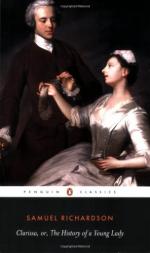I will now answer your questions: but indeed I hardly know what to write, for fear of widening still more the unhappy difference between you. But yet such a young lady must command every thing from me. This then is my answer:
I wrote not any letter to him on or about the 7th of June.
Neither I nor my steward know any such man as Captain Tomlinson.
I wrote not to my niece to meet me at Reading, nor
to accompany me to my
cousin Leeson’s
in town.
My chancery affair, though, like most chancery affairs,
it be of long
standing, is,
nevertheless, now in so good a way, that it cannot
give me occasion
to go to town.
Nor have I been in town these six months: nor
at Hampstead for
years.
Neither shall I have any temptation to go to town,
except to pay my
congratulatory
compliments to Mrs. Lovelace. On which occasion
I
should go with
the greatest pleasure; and should hope for the
favour of your
accompanying me to Glenham-hall, for a month at
least.
Be what will the reason of your inquiry, let me entreat you, my dear young lady, for Lord M.’s sake; for my sake; for this giddy man’s sake, soul as well as body; and for all our family’s sakes; not to suffer this answer to widen differences so far as to make you refuse him, if he already has not the honour of calling you his; as I am apprehensive he has not, by your signing by your family-name.
And here let me offer to you my mediation to compose the difference between you, be it what it will. Your cause, my dear young lady, cannot be put into the hands of any body living more devoted to your service, than into those of
Your sincere admirer, and humble servant,
Eliz. Lawrance.
LETTER LIX
Miss Clarissa Harlowe, to Mrs.
Hodges
Enfield, June 22.
MRS. HODGES,
I am under a kind of necessity to write to you, having no one among my relations to whom I dare write, or hope a line from if I did. It is but to answer a question. It is this:
Whether you know any such man as Captain Tomlinson? and, if you do, whether he be very intimate with my uncle Harlowe?
I will describe his person lest, possibly, he should go by another name among you; although I know not why he should.
’He is a thin, tallish man, a little pock-fretten, of a sallowish complexion. Fifty years of age, or more. Of good aspect when he looks up. He seems to be a serious man, and one who knows the world. He stoops a little in the shoulders. Is of Berkshire. His wife of Oxfordshire; and has several children. He removed lately into your parts form Northamptonshire.’
I must desire you, Mrs. Hodges, that you will not let my uncle, nor any of my relations, know that I write to you.




